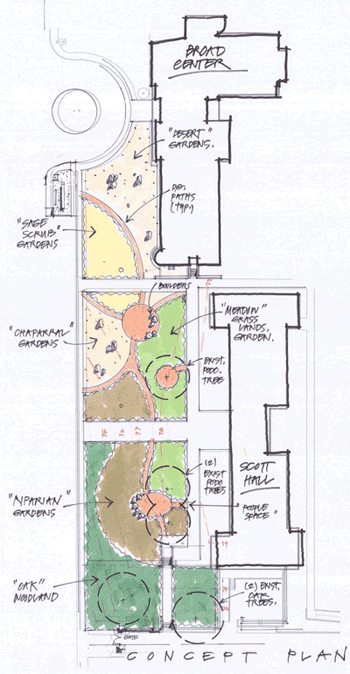 Project History
Project History
The John R. Rodman Arboretum Reclamation Project started as an independent study where a small group of students decided to strive for a more sustainable ecosystem in front of Scott Hall. The Scott Hall and Broad Center lawns were an underutilized area that used large amounts of natural resources. The group’s goal was to create drought-tolerant gardens, which would hopefully be utilized by more of the students. This follows a general plan at Pitzer College to become a more sustainable campus and includes, among other things, more sustainable grounds.
As the independent study began to brainstorm, the idea came forward that the gardens should be student-designed. However, to receive city approval in a timely manner, a structured plant list was required. At this point, rough draft layouts were drawn up and submitted to the City of Claremont. Some changes were made to the plan in order to meet city regulations, but the plan to have a diverse system of gardens remained. In the end, the College and students decided that melding six different types of ecosystems would provide a unique look to the area. These gardens would be riparian, desert, chaparral, grasslands, oak woodlands, and coastal sage scrub. These different ecological areas have significant overlap in the types of plants found in each area, as these diverse habitats meld and run through one another in nature.
The project began to receive more attention, and a class, Eco-logical Landscaping, was created so that students could have a direct impact on the creation and maintenance of the gardens. After many changes to the original plan, the City of Claremont approved the final design, and in fall 2008, the class started to move forward.
Professor of Environmental Analysis Paul Faulstich and Arboretum Director Joe Clements (now retired) ensured the success of the project, and have guided groups of students to produce a remarkable product. Without Paul’s vision and Joe’s extensive knowledge of native plants and gardening, none of this work would have been possible. As a class, we would like to thank them for helping this dream of a more sustainable Pitzer come true.